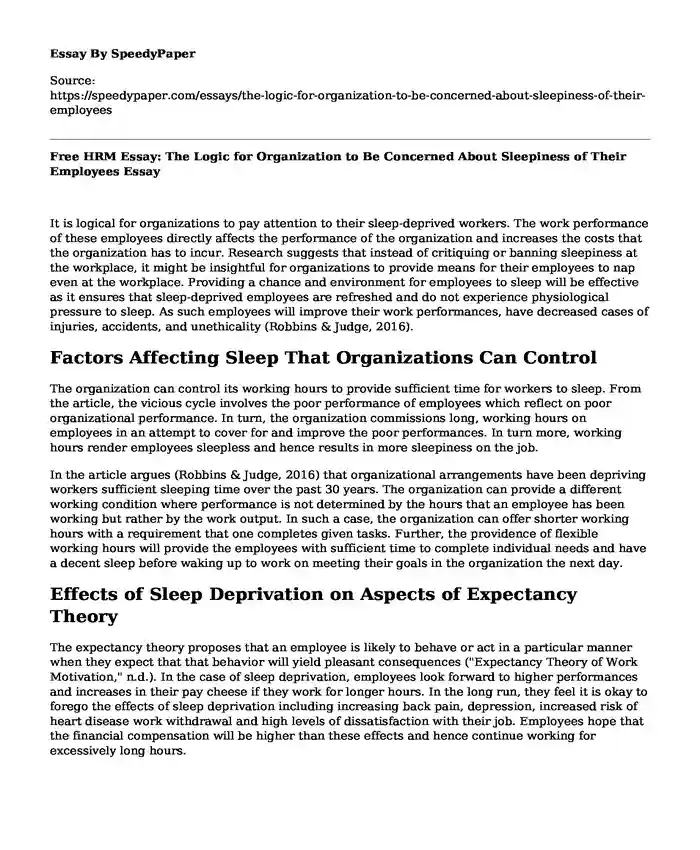
| Type of paper: | Essay |
| Categories: | Management Human resources |
| Pages: | 3 |
| Wordcount: | 696 words |
It is logical for organizations to pay attention to their sleep-deprived workers. The work performance of these employees directly affects the performance of the organization and increases the costs that the organization has to incur. Research suggests that instead of critiquing or banning sleepiness at the workplace, it might be insightful for organizations to provide means for their employees to nap even at the workplace. Providing a chance and environment for employees to sleep will be effective as it ensures that sleep-deprived employees are refreshed and do not experience physiological pressure to sleep. As such employees will improve their work performances, have decreased cases of injuries, accidents, and unethicality (Robbins & Judge, 2016).
Factors Affecting Sleep That Organizations Can Control
The organization can control its working hours to provide sufficient time for workers to sleep. From the article, the vicious cycle involves the poor performance of employees which reflect on poor organizational performance. In turn, the organization commissions long, working hours on employees in an attempt to cover for and improve the poor performances. In turn more, working hours render employees sleepless and hence results in more sleepiness on the job.
In the article argues (Robbins & Judge, 2016) that organizational arrangements have been depriving workers sufficient sleeping time over the past 30 years. The organization can provide a different working condition where performance is not determined by the hours that an employee has been working but rather by the work output. In such a case, the organization can offer shorter working hours with a requirement that one completes given tasks. Further, the providence of flexible working hours will provide the employees with sufficient time to complete individual needs and have a decent sleep before waking up to work on meeting their goals in the organization the next day.
Effects of Sleep Deprivation on Aspects of Expectancy Theory
The expectancy theory proposes that an employee is likely to behave or act in a particular manner when they expect that that behavior will yield pleasant consequences ("Expectancy Theory of Work Motivation," n.d.). In the case of sleep deprivation, employees look forward to higher performances and increases in their pay cheese if they work for longer hours. In the long run, they feel it is okay to forego the effects of sleep deprivation including increasing back pain, depression, increased risk of heart disease work withdrawal and high levels of dissatisfaction with their job. Employees hope that the financial compensation will be higher than these effects and hence continue working for excessively long hours.
Importance of Incorporating Nap Rooms to Demonstrate Aspects of Equity Theory
Companies are encouraging and embracing napping rooms at the workplace to solve the problem of sleepiness (Robbins & Judge, 2016). Napping rooms bring an employee closer to having a good-quality sleep. The aspect of fairness in equity theory is promoted by napping rooms as employees who could not sleep for other reasons are given a chance to have a good-quality sleep and hence will manage to maximize production in their active wakeup hours.
Steps A Manager Can Take to Help Sleep-Deprived Employees and Theories That Inform the Decisions.
Using expectancy theory, a manager can embrace napping rooms. The manager would embrace and share with employees that the quality sleep is directly correlated to work performance and teach employees that long working hour with sleep deprivation will lead to reduced quality and performance at work (Drummond, 2006). This aspect should also be used to promote personal initiatives to have regular quality sleep.
A manager should also introduce flexible working hours and promote autonomy among employees. When employees feel they are trusted and individually reasonable to complete a task, they are more motivated to do it on time and to perfection. With autonomy and education on the importance of sleep employees will plan their schedules and allocate decent hours for sleeping.
References
Drummond, S. P. (2006). PR01 - The Effects of Total Sleep Deprivation and Recovery Sleep on Cognitive Performance and Brain Function. doi:10.21236/ada460345
Expectancy Theory of Work Motivation. (n.d.). The SAGE Encyclopedia of Industrial and Organizational Psychology, 2nd edition. doi:10.4135/9781483386874.n159
Robbins P.S & Judge T. A, (2016). Essentials of Organizational Behavior, Instructor Manual, (13th ed.). Pearson.
Cite this page
Free HRM Essay: The Logic for Organization to Be Concerned About Sleepiness of Their Employees. (2022, Feb 25). Retrieved from https://speedypaper.net/essays/the-logic-for-organization-to-be-concerned-about-sleepiness-of-their-employees
Request Removal
If you are the original author of this essay and no longer wish to have it published on the SpeedyPaper website, please click below to request its removal:
- Essay Sample on Teaching English as a Second Language
- Trump vs Clinton
- Essay Example: The Concept of Power, Class, Hegemony, Negotiation, And Desire
- Free Paper with a Report on BMW's Contemporary Business Strategy
- Importance of World Health Organization - Free Essay Sample
- Paper Example: The Stanford Prison Experiment
- Free Essay: Contemporary Environmental Issue
Popular categories




